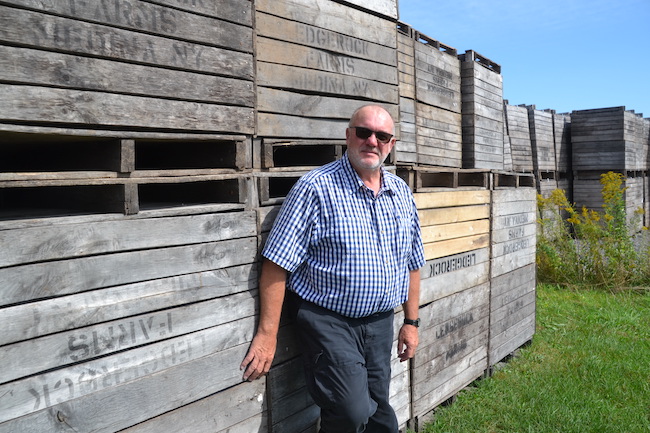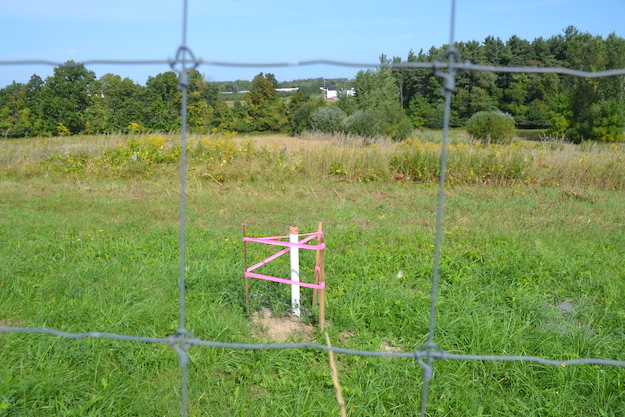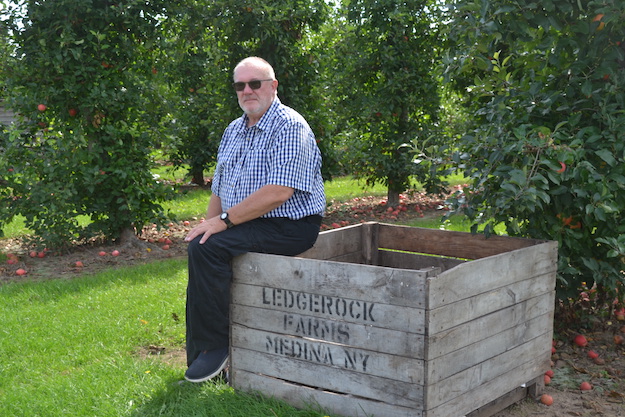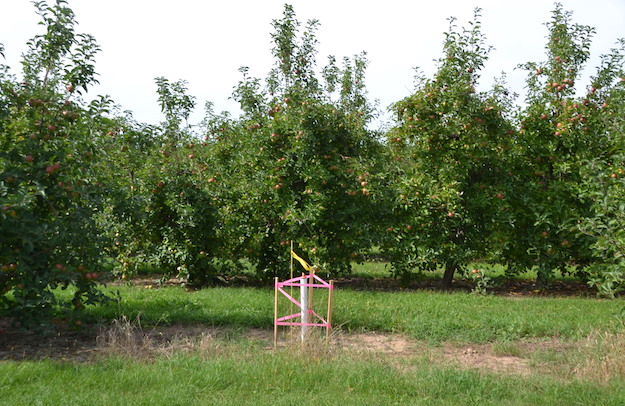Shelby town supervisor, leasing land for turbines, sees community benefits with wind project
Jeff Smith also says revenue for farm should keep orchard in family for years to come

Photos by Tom Rivers: Jeff Smith, the Shelby town supervisor and owner of Ledge Rock Farms, is pictured at the farm with some of the bins on Wednesday. Smith has retired from active operation of the farm on Route 63 but he wants to keep the land in the family.
SHELBY – Jeff Smith, like many farmers in Orleans County, has a stack of solicitation offers from solar and wind energy companies looking to use his land for projects.
Smith never really considered solar. The panels would take up too much of his 100-acre orchard.
He also didn’t want several turbines scattered on the property.
He was intrigued by a proposal from Borrego Energy. The company, after initially wanting to construct four wind turbines on Smith family property, would like to put up two – one in an orchard owned by Jeff and his wife Char and their three grown children, and the other next door on land owned by Smith’s two sisters.
The project, when complete, would take up a half-acre and have the capacity to generate 8.4 megawatts of power.
The two turbines have been a contentious issue at recent Shelby Town Board meetings. Many residents say the two turbines, peaking at 633 feet high, would dramatically change the landscape, and nearby residents would suffer from shadow flicker, infrasound and possible impact to property values. Residents also are concerned the turbines could be destructive to birds and other wildlife.
Smith has recused himself from any voting and formal discussions about the project in board meetings.

Borrego Energy is planning for one of the two turbines near this deer fence about 2,000 feet from Route 63. In the background in this photo is Roberts Farm Market on Maple Ridge Road.
Speaking to the Orleans Hub on Wednesday, Smith said the family wouldn’t have been open to leasing land to Borrego without financial benefits to the community and without the power being available locally at a discount. Borrego said residents and businesses who sign up for a community wind program can get the electricity at a rate less than non-renewable energy providers.
“I feel very strongly we have to start doing something about our energy situation,” Smith said. “These things aren’t perfect but they are getting better. When Kennedy said we’re going to the moon, they didn’t roll out a rocket the next day.”
The taller turbines generate more power, so fewer of them are needed, Smith said.
The 75 wind turbines in the High Sheldon project in Wyoming County peak at about 400 feet, and they each have a capacity for 1.5 megawatts, about the third of the power that is proposed for the two turbines in Shelby.

The Smith family has been farming in Shelby since 1898. Jeff Smith said the revenue from the turbines should keep the land agriculture and in Smith control for years to come.
The farm along Route 63, just south of the Village of Medina, has been in the Smith family since 1898. Smith is the fourth generation to work the farm.
He said it is a challenging business, especially at 100 acres, which is a smaller orchard in today’s farm economics. Many years there are razor-thin margins, Smith said.
At 68, he opted to lease out the land this year to another fruit grower, Toussaint Farms in Ridgeway. Smith said he wanted less stress in his life and he knows Toussaint will do a good job with the Smith acreage.
Smith and his family have made big changes to the farm over the years. Cherries used to be the dominant crop on the farm but that changed when the tart cherry market dried up. Those trees were removed. Smith in the past 20 years has gradually shifted to a high-density orchard, with smaller apple trees supported in a trellis system.
It’s a lot of work planting and managing those trees – and expensive. Smith said he has tried to replace about 5 percent of the trees or 5 acres each year, at a cost of $20,000 per acre. The high-density orchards have 1,500 trees per acre with posts and wire.
The Smiths have had to sell off land before to keep the farm going. In another financial pinch, Smith worked as a teacher starting at age 46 and did that for 10 years as a middle school technology teacher in Medina from 2001 to 2011.
The revenue for two wind turbines gives the farm more security for the future, to help ensure the land stays farmland and in the family’s control.
Smith attended the Sept. 13 Town Board meeting, where several speakers opposed the turbines being so close to the village and altering the landscape in a dramatic way. Smith watched the meeting from a chair from the side of the room, away from the other Town Board members.
Smith, speaking on Wednesday, said he took issue with speakers who implied the board was “too dumb” and wasn’t qualified to review the environmental impacts of the project.
Smith said the board members have different backgrounds, and often disagree. They have an engineer and land use attorney to assist the town in reviewing the project.
Ryan Wilkins, the deputy town supervisor, said Smith has stayed out of conversations at the town hall about the project.

Jeff Smith said farming is challenging to keep viable, especially with a 100-acre orchard, which is smaller than most fruit operations these days. Smith left farming full-time from age 46 to 56 and worked as teacher, while trying to keep the farm going. Now at 68 he has retired from the farm’s active operation and leases the land to Toussaint Farms.
Smith joined the Town Board in April 2018. He was appointed councilman, filling a vacancy after the death of long-time councilman, Dale Stalker, in December 2017. About six months later he was appointed by the other board members to be town supervisor following the resignation of Ed Houseknecht on May 31, 2018. Smith was appointed on June 9, 2018.
Wilkins credits Smith for stepping up to be town supervisor when no other board members were willing to take on the job.
Smith said he hasn’t tried to steer a project to his family’s property in an improper role as a town official.
“It hurts that people think I’m trying to line my own pocket,” he said.
Smith said he was receiving many solicitations from wind and solar companies around the time he joined the board. He knows many other farmers in the county also have been inundated with similar requests.
Smith’s property is a near a three-phase electrical line, which is desirable for companies as a transmission line. The Smith land is also at a slight hill. He knows from his years of spraying the orchards that it’s breezy with gusts at the property.
“The wind always blows at our place,” he said.
He said he signed a letter of intent with Borrego in September 2019. In January 2020, there was a public hearing about a meteorological tower on his land. That 200-foot-high met tower was up about 18 months. It was removed in February 2022.
Wilkins said he looked through town minutes and there have been 13 meetings and three public hearings about the turbines and met tower.
“People say they feel this is something new and is being shoved down their throats,” he said. “But it’s been talked about and discussed.”
The minutes from prior meetings are available on the town website. Shelby also has been broadcasting its meetings live through YouTube. It started that in the early days of the Covid pandemic.
Wilkins, as deputy town supervisor, has been running the meetings when the turbines are discussed.
He said the board continues to gather information. It will discuss the environmental impact statement during the next meeting at 7 p.m. on Oct. 11. He said the board isn’t in a rush to make a decision on that study, and the review of a site plan and whether Borrego will get a special use permit for the project.
“We’re not trying to sneak anything through,” Wilkins said. “We’re trying to get as much information as possible to make the best decision for the town.”

The spot in the orchard of Rome apples is the second of two turbines. Jeff Smith steered Borrego from more valuable apples in the orchard, such as Honeycrisp. The Rome apples are used by a processor in Quebec.
Shelby also would need to give the turbines a height variance. The town code caps the height at 500 feet. Wilkins said that regulation was enacted before the new generation of wind turbines at over 600 feet high.
Wilkins said the big benefit in the larger turbines is that fewer of them are needed. The two turbines proposed for Shelby would generate 8.4 megawatts. It would take six turbines from 10 years ago, at a 1.5 megawatt capacity, to be close to on par with the electricity from the taller turbines.
“The way they are going now is bigger and more efficient turbines , which take up less space,” Wilkins said.
He doesn’t expect Borrego will pursue more than two turbines because he said that electricity, along with an existing solar project in Ridgeway by Allis and Beals roads, would nearly maximize the capacity of a substation on Bates Road.
The town is in the early stages of talking with Borrego about a host community benefit package. Wilkins said he wants to use the numbers approved for Barre as a starting point in the discussion.
Apex Clean Energy agreed to $9,000 per megawatt for the local governments for the 184.8 megawatt Heritage Wind project in Barre.
The town gets $6,750 per megawatt annually as part of the deal with Apex or $1,247,400. With the PILOT, the county and Albion and Oakfield-Alabama school districts share $2,250 per megawatt or $415,800.
With those numbers, Shelby would get $56,700 annually ($6,750 multiplied by 8.4) with the Medina school district and the county sharing $18,900 annually ($2,250 multiplied by 8.4) in a PILOT.
Wilkins said other concessions could also be negotiated as part of a host community benefits package.
But he stressed those negotiations are just getting started.
“There are no numbers yet,” Wilkins said.









































































